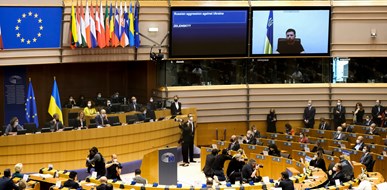[Call for papers] Between crisification and legal resilience: Change and stability in EU external relations law
Published 28 March 2024
@Shutterstock - Ukrainian president Zelenskiy addresses the European Parliament after the Russian invasion of Ukraine, in Brussels, Belgium March 1, 2022.
The Centre for the Law of EU External Relations (CLEER) and the Asser Institute are inviting papers for a conference on the topic of ‘Crisification and Legal Resilience: Change and Stability in EU External Relations Law’ which will be held on 11 October 2024, at the Asser Institute in The Hague. Applicants are invited to submit an abstract of max. 800 words by 15 May 2024. Selected speakers are expected to submit a full draft of their paper (8.000-10.000 words) by 1 September 2024.
In recent years, crisis narratives have dominated EU legal discourse. Policy makers and academics alike have used ‘crisis vocabulary’ in order to articulate and conceptualise recent challenges faced by the Union - including the eurozone and migration crises, Brexit, the rule of law crises, the global pandemic as well as the war in Ukraine – as well as its response thereto.
While traditionally crises are seen as moments of rapture in a continuum of normal law and policy-making within a given governance field, the recent proliferation of crises – whether real or perceived – has arguably led to a perpetual state of exceptionalism. In turn, this new normal exposes the law to exacting demands about what it must realise: crisis-thinking favours swift actions and allows for the adoption of exceptional measures – something which is often at odds with the procedural and judicial guarantees of decision-making. Some authors have already warned about the ‘crisification’ of EU policy-making which prioritises quick decision-making over the traditional processes of democratic deliberation.
A matter of perception
Others, such as De Witte (CMLRev. 2022), have drawn a conceptual distinction between crises and emergencies. While crises fall within a broader category and their existence is largely a matter of perception, emergencies constitute a narrower category referring to sudden threats that require the adoption of special laws. On this basis, De Witte discusses the contours of the nascent EU emergency law.
This ‘crisification’ raises a whole host of questions for EU law - and for EU external relations law in particular. First, the ‘crisis’ prism allows us to recast the tension between stability and change in EU external relations law in different terms and thus, to gauge broader questions pertaining to the resilience of the EU legal system from a fresh vantage point of view. How effectively can the Union respond and adapt to sudden changes in social reality that require immediate action? The normative dimension of this discussion is equally important. While crises may be seen as catalysts for change and could offer the opportunity for further integration, ad-hoc emergency measures do not usually envisage a role for the Parliament or the CJEU and thus, have been criticized for undermining the Union’s legitimacy.
Strategic autonomy
Furthermore, this trend also invites reflection on the (future) normative identity of the EU. For example, the energy and security crises caused by the war in Ukraine have amplified calls for strengthening the EU’s ‘strategic autonomy’ – a term connoting the ability of the Union to act independently on the international stage in order to safeguard its fundamental values, interests, independence and security. At the same time, the EU has consistently portrayed itself as a polity committed to the ethos of multilateralism. How is the strive for multilateralism to be squared with calls for more autonomy? The crisis-angle also arguably allows us to assess how the EU handles (structural) questions of social justice and (re)distribution in a globalised world. Recent challenges (such as the migration crisis) create inequalities and asymmetric burdens, which the Union does not necessarily have the tools to systematically deal with, thereby putting to the test the assumption that participation in the European project is, at the end of the day, beneficial to all.
In this light, the conference aims to explore the overarching topic of ‘crisification’ of EU external relations law and invites critical reflection on different aspects of the debate. The conference conveners aim to publish the papers stemming from the conference in the CLEER Paper series – subject to peer review. The conveners also aim to partially cover travel and accommodation costs for the speakers.
Abstract submission:
Applicants are invited to submit an abstract of max. 800 words by 15th May 2024. Selected speakers are expected to submit a full draft of their paper (8.000-10.000 words) by 1st September 2024.
Read the full call.
Submit your abstract here.
